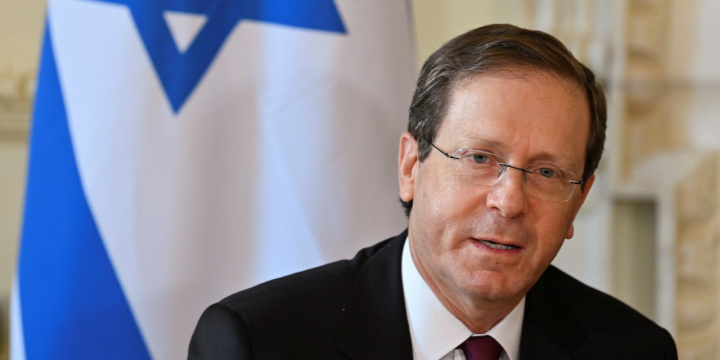 Israelis’ Loss of Trust in State Institutions Is ‘Deeply Troubling,’ Says President Herzog
Israelis’ Loss of Trust in State Institutions Is ‘Deeply Troubling,’ Says President Herzog
Sharon Wrobel
 Israeli President Isaac Herzog speaks as he meets with British Prime Minister Boris Johnson (not seen) in London, Britain, November 23, 2021. Justin Tallis/Pool via REUTERS
Israeli President Isaac Herzog speaks as he meets with British Prime Minister Boris Johnson (not seen) in London, Britain, November 23, 2021. Justin Tallis/Pool via REUTERS
The recent drop in Israeli public’s trust in state institutions is “deeply troubling” and “keeps me awake at night,” Israeli President Isaac Herzog declared Thursday, citing the findings of an annual survey published by the Israel Democracy Institute.
Herzog said that the prolonged decline in public confidence revealed in the Israel Democracy Index represented a “warning light.”
“There is no substitute for Israel’s democracy, and there is no substitute for its state institutions, and therefore the loss of confidence keeps me awake at night,” Herzog said. “I believe that the growing tension and distrust between authorities — the executive, the legislature, and the judiciary — have brought about a decline in the public’s confidence, seeing and hearing all these brawls and words of criticism; some to-the-point, some less so.”
The 19th annual Democracy Index “reveals a complex picture regarding the level of public trust in key institutions and officials, confidence in the country’s civil service and the overall strength of Israeli democracy,” the IDI stated. The poll was conducted during a year which marked the end of the Benjamin Netanyahu era and the arrival of a new coalition government, after four elections in two years, led by new Prime Minister Naftali Bennett and which included an Arab party for the first time in decades. Meanwhile, opposition leader Netanyahu faced an ongoing trial for corruption charges.
The IDF, as in previous years, was found to be the most trusted institution among Jewish Israelis. But the level saw a notable decline, to the lowest point since 2008 — with 78 percent surveyed replying that they trusted the military, down from 90 percent in 2020.
Confidence in Israel’s Supreme Court, which has shown a steady downturn in recent years, declined to 41 percent from 42 percent. Trust in Israel Police fell to 33.5 percent from 41 percent; and at the bottom of the list ranked trust in political parties, with 10 percent, and the Knesset, with 21 percent. Against this, trust in the government rose slightly to 27 percent from 25 percent.
The survey revealed that three-quarters of Arab Israelis and 44 percent of Jewish Israelis believe that democratic rule in Israel is in jeopardy.
Overall, the IDI research showed that among Arab Israelis, the levels of trust in the government and the Knesset increased compared with the previous year. Their confidence in the Supreme Court rose to 49 percent from 40 percent; trust in the IDF increased to 36 percent from 32 percent; and in political parties, it rose to 22 percent, from 14 percent. Arab Israelis’ trust in the Knesset rose to 25 percent from 17.5 percent, and confidence in the government was up at 28 percent versus 14 percent last year. However, they reported lower trust in the police and media, the survey showed.
Yohanan Plesner, president of the Jerusalem-based IDI, recommended that the Israeli government internalize the “worrying” trend in the reputation in public institutions of Israeli democracy, and draw lessons from the data when planning public policy.
“Despite the many challenges we face as a country, it is inspiring to see that a vast majority of Israelis believe that their country is a good place to live,” Plasner said.
According to the survey, 76 percent of Jewish Israelis and 66 percent of Arab Israelis said that Israel is a good place to live; and 70 percent and 81 percent, respectively, said they would prefer to stay and live in Israel even if they were promised citizenship in another Western country.
The Israel Democracy Index study is based on a poll conducted on the internet and by telephone in June and October of last year, among a sample of 1,004 men and women surveyed in Hebrew and 184 in Arabic.
Zawartość publikowanych artykułów i materiałów nie reprezentuje poglądów ani opinii Reunion’68,
ani też webmastera Blogu Reunion’68, chyba ze jest to wyraźnie zaznaczone.
Twoje uwagi, linki, własne artykuły lub wiadomości prześlij na adres:
webmaster@reunion68.com
